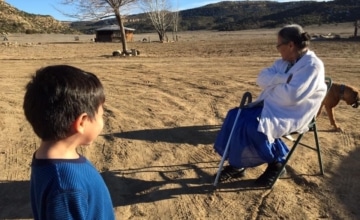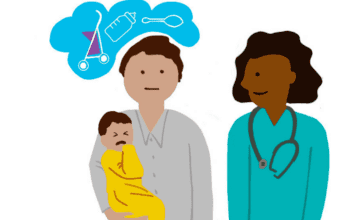Diane Lee, University of Colorado School of Medicine
Verenea Serrano and Jonna von Schulz, University of Colorado School of Medicine Children’s Hospital Colorado
Devin Fields, Children’s Hospital Colorado
Melissa Buchholz, University of Colorado School of Medicine Children’s Hospital Colorado
Abstract
Pediatric complex care clinics offer an optimal environment for integrated behavioral health services for infants and young children with medical complexity (CMC). Integrated behavioral health providers are well positioned to provide accessible care and promote development and well-being for this population with unique psychosocial needs and stressors. Furthermore, given the long-standing racial and ethnic disparities in the health care system, integrated behavioral health providers must confront and combat these disparities and the impact of racial injustice and trauma on the health of infants, young children, and families. This article describes a family and their infant who were seen by an early childhood integrated behavioral health provider (HealthySteps specialist) in a complex pediatric primary care clinic and the realities of systemic racism that the family faced as they navigated their infant’s medical care. This example highlights the application and adaptation of the HealthySteps program in a complex pediatric primary care clinic and ways to support and partner with families and providers to combat systemic racism and promote health equity.
Health disparities for people of color are well documented. Research indicates that within the health care system, Black and Latinx patients experience poorer quality of care over the lifespan (Stevens & Shi, 2002), have less access to resources (Koschmann & Hooke, 2019), face more barriers in seeking services (Lescano & Rahill, 2018), and have lower strength of affiliation with providers (Stevens & Shi, 2002). These disparities significantly impact health outcomes for people of color. Rates of preterm birth, low birthweight, and infant mortality for Black infants are more than twice that of White infants (Keating et al., 2020). Further, maternal mortality is 3 times higher for Black women, and Black and Latinx women are significantly more likely to experience chronic health conditions associated with birth-related complications compared to White women. This trend has persisted over decades, indicating a long history of a biased system of care for families of color (Rossen & Schoendorf, 2014). In the neonatal intensive care unit (NICU), Black babies have higher rates of chronic lung disease and pneumothorax but lower rates of breastfeeding before discharge when compared to White peers (Profit et al., 2017). Overall, children of color have significantly higher rates of morbidity and mortality related to poor maternal, prenatal, and early childhood health as well as chronic and congenital diseases (Lescano & Rahill, 2018). These results show that families of color experience health disparities at many levels of care and that these disparities influence both health outcomes and medical complexity.
There are ways to address these disparities and provide equitable care to families most in need. Several protective and buffering factors against the overwhelmingly negative effects of health disparities for people of color have been identified within pediatric primary care. For example, effective and supportive communication between family and provider can be a protective factor for families. Specifically for Black families, measures of trust increased when providers used communication styles focused on building partnerships and families were able to see the same provider over time (Horn et al., 2012). As trust increased, so did parent satisfaction and likelihood of adhering to prescribed treatment recommendations (Nobile & Drotar, 2003).
These findings have important implications for how providers can mitigate health disparities by providing care that prioritizes interpersonal connection and continuity. Specifically in early childhood, pediatric primary care settings are essential to supporting families with young children in a universal, culturally responsive, accessible, and non-stigmatized care model (Stille et al., 2010). Primary care settings that approach care through a relationship-based and collaborative lens will likely be most successful in mitigating health disparities.
HealthySteps, a program of ZERO TO THREE, is an evidence-based, interdisciplinary approach to providing enhanced primary care to children birth through 3 years old. HealthySteps integrates behavioral health specialists with expertise in child development and infant mental health into pediatric primary care settings to increase health, well-being, and school readiness for children and families (healthysteps.org). When compared to controls, HealthySteps families reported higher satisfaction with care, received more developmentally appropriate care and preventative services, had timelier well-child and immunization visits, and used less physical discipline techniques (Minkovitz et al., 2003). Given these outcomes, clinics implementing HealthySteps are well-suited to promote positive health outcomes in communities of color and mitigate the negative impacts of health disparities.
HealthySteps is implemented in nearly 180 primary care clinics nationally. One of these sites is unique because it serves children with medical complexity (CMC). This complex pediatric primary care clinic serves approximately 5,000 CMC and their families. Caregivers of CMC are at risk for increased stress and mood symptoms related to caring for a CMC (Cohn et al., 2020; Cousino & Hazen, 2013). Therefore, in this clinic, HealthySteps modifications have been made to support young CMC and their families. Modifications have focused on supporting caregivers with adjustment to illness, caregiver role and family changes, using positive and reflective parenting strategies in the context of the child’s medical needs, and understanding and coping with developmental and behavioral differences that are common in CMC. Modifications have also included screening and support for symptoms of medical trauma, adapting and creating additional materials for caregivers specific to caring for a young CMC, and universally offering HealthySteps to account for the likelihood of increased caregiver stress and trauma symptoms in the context of the child’s complex medical needs. While these additional stressors for families caring for CMC are regularly considered and acknowledged by providers, issues of systemic racism and injustice both in the community and within the medical system are not. Given that families of color with a CMC have increased frequency of interactions and experiences within the health care setting, it becomes vital to consider racial and ethnic health disparities. Within the primary care setting, HealthySteps provides an opportunity to form relationships with families at the start of their medical care, thereby cultivating a partnership and creating spaces where experiences of medical and racial trauma and disparity can be shared, discussed, and addressed over time.
Maya’s Story
Maya was a 2-month-old, Black infant who came with her mother to establish care at a complex pediatric primary care clinic following her discharge from the NICU. (Identifying information has been changed to protect patient confidentiality.) She was diagnosed prenatally with a heart block that resulted in need for a pacemaker 2 days after her birth. At the initial visit, Maya’s primary care provider (PCP) encountered a situation that was much more complex than anticipated.
The 60-minute initial appointments in her clinic are longer than those in traditional primary care settings. However, there were multiple complexities to address in that initial visit: Maya’s pacemaker, ongoing oxygen needs, coordinating appointments with multiple specialists, a positive psychosocial screen for financial stress, assisting Maya’s mother with the process of becoming her paid certified nursing assistant (as is supported by Medicaid in her state), and an elevated maternal depression screen. The provider saw all these needs, an infant who was doing well after a prolonged hospitalization, and a parent who appeared to have an overwhelming number of questions and uncertainty about Maya’s condition and was not reassured by the provider’s assessment about Maya’s improvements and stability medically.

Effective and supportive communication between family and provider can be a protective factor for families. Photo: PorporLing/shutterstock
Maya’s PCP was concerned about her mother’s well-being given Maya’s extended stay in the NICU and the resulting psychosocial stress. The provider consulted the HealthySteps team and shared her impressions. A HealthySteps specialist then met with Maya and her mother. In this initial visit, Maya’s mother shared that Maya’s medical journey in her 2 short months of life had been difficult and she was confronted with the systemic racism in health care from the beginning. Maya’s heart condition was diagnosed prenatally a couple weeks before her birth. Maya’s mother shared that she voiced her concerns to her obstetrician multiple times and was reassured that Maya was healthy. Even after the shock of a prenatal diagnosis, she was reassured multiple times that Maya’s condition was stable and treatable and that an early delivery was unnecessary. This reassurance was in stark contrast to the reality of Maya’s birth—an emergency cesarean section, need for resuscitation, and immediate transfer to the cardiac intensive care unit. From the family’s perspective, it was the failure of providers to listen and respond to multiple voiced concerns that resulted in Maya requiring a pacemaker, which then led to a significant burn by the pacemaker and further complications. Maya’s mother shared that as a Black woman, she felt her concerns were dismissed by medical providers. Furthermore, she shared her frustration that even with an advanced education (a master’s degree), she was still not heard. The realities of disparities in experience, maternal mortality, and health outcomes could not be ignored. Together, the HealthySteps specialist and Maya’s mother discussed her direct experiences of systemic racism as she navigated her infant’s care, as well as feelings of guilt and hopelessness that emerged as she felt her advocacy for her child was not enough. They also reflected together on what it was like for Maya’s mother to share her experiences in a new clinic that was undoubtedly imbued with its own form of systemic racism.
In response, Maya’s mother shared that she felt anxious that providers would view her as unable to care for her baby. She recognized that she asked many questions and voiced many concerns but did not find reassurance in providers’ responses. Despite her already elevated postpartum depression screen, she shared that she under-reported symptoms as she worried that she would be judged unfit to care for her baby. She worried that her mistrust of providers would be paralleled by their mistrust of her. Understanding her experiences in the context of Maya’s traumatic birth, the unexpected nature of the full extent of her diagnosis, and the disparities in care she experienced, a more complex picture of this mother and baby emerged. This family was confronting not only the unexpected reality of having a child with special health care needs but also the pervasive disparities in the medical system. Of course, Maya’s mother’s fears were not allayed by reassurance from providers. Reassurance in the past had meant that concerns were ignored and the family’s worst fears about their new baby’s health had come true. Furthermore, Maya’s mother continued to experience guilt related to feeling that she could have prevented Maya from needing a pacemaker if only she had done more. The HealthySteps specialist and Maya’s mother reflected on how this guilt was contributing to her elevated postpartum depression screen and how her experience of parenthood thus far felt so different from her hopes and expectations. They again explored together what it was like for Maya’s mother to bring Maya to a system of care in which she was repeatedly dismissed and personally experienced systemic racism. Maya’s mother shared that her guilt came up each time she had to bring Maya to what seemed like endless appointments.
After this initial visit, the HealthySteps specialist consulted again with the PCP. They discussed Maya’s diagnosis and prognosis and whether an earlier diagnosis and delivery would have prevented the subsequent complications, as was Maya’s mother’s view. The PCP shared that Maya’s condition at birth was more severe than expected, that she did not respond as well as hoped to initial treatment, and that earlier diagnosis or intervention would not necessarily have prevented the need for the pacemaker. Although initially very eager to learn and provide this information from a medical perspective to Maya’s mother, the HealthySteps specialist paused to reflect with the other members of the team on the importance of the information. They reflected together with the PCP that the medical facts were far less important than Maya’s mother’s experience and perspective of her baby’s care. They also wondered together about what it was like for Maya’s mother to meet with the HealthySteps specialist, who also identified as a person of color, and her experience of receiving care in a clinic whose providers are predominantly White. Together and individually, this multidisciplinary team was encouraged to reflect on how to provide a different experience for Maya and her family and, more broadly, their roles in perpetuating health disparities and ways to promote health equity in their clinic.
Over the next several months, Maya was seen by a HealthySteps specialist each time she returned to clinic. As the HealthySteps team began to develop a trusting relationship with the family, they continued to discuss the family’s experiences in the medical system and in their clinic, coping with Maya’s illness, and questions about Maya’s development. Maya’s mother shared that she often felt very alone in having a baby with a pacemaker and asked if she might be able to learn about another family’s experience of navigating care and be able to ask them questions about trusting providers with their child’s medical care. The HealthySteps team then coordinated with the outreach coordinator in cardiology who facilitated a match for the family.
In discussing Maya’s mother’s well-being, she shared that she had not followed up with her obstetrician for postpartum care, especially given that a note in her medical chart stated that she became “angry” at an appointment. Understandably, she was both frustrated that the provider interpreted her simply voicing her concerns as anger and was worried about how future providers would view her given this documentation. Maya’s mother shared that she would like to give feedback about her experience with care to prevent other patients from having a similar experience. Again, the HealthySteps specialist and Maya’s mother discussed how her concerns were unheard and overlooked, how she was not treated as a collaborator in her health care, and how bias was perpetuated even at the level of the medical record. The HealthySteps specialist discussed with Maya’s mother the available options and she indicated that she would like the information to contact patient relations. In addition, Maya’s mother shared that she continued to have anxiety related to Maya’s care, whether Maya would need another surgery, and Maya’s development. She was uncertain how much activity Maya could tolerate given her cardiac condition and had some difficulty with noticing progress and naming her favorite things about Maya’s development. At this opportunity, the HealthySteps specialist provided information about play, attachment, and ways to support Maya’s development. It is important to note that it was only after the HealthySteps specialist and Maya’s mother named the many disparities that the family faced that they were able to also discuss issues related to Maya’s development. Infants and young children develop only in their contexts, which for Maya and many other children prominently includes the reality of inequity and systemic racism in the health care system.
At subsequent visits, the HealthySteps specialist continued to support the family and Maya’s development. A couple of months later, Maya’s mother was excited to share about Maya’s development, describing Maya as “very smart,” developing good head control, smiling a lot, and playing with her family. The HealthySteps specialist and Maya’s mother celebrated the milestones in Maya’s development and the ways that Maya’s mother was enjoying watching Maya grow and develop. In the context of discussing sleep, they reflected on Maya’s mother’s experience of hearing Maya cry—that it often brought back traumatic memories of Maya’s hospitalization and the multiple alarms that sounded when Maya cried. She worried and had questions about whether crying would negatively affect Maya’s heart. The HealthySteps specialist consulted with Maya’s PCP who provided reassurance that crying would not negatively impact Maya’s cardiac functioning. Maya’s mother and the HealthySteps specialist then collaborated in creating a plan for Maya’s sleep. Maya’s mother also shared an update about her experience in navigating Maya’s care. She described a recent discussion with providers regarding whether Maya should have a feeding tube (g-tube) placed. She noted her surprise when she was asked about her opinion. Her experiences thus far had left her feeling unable to have or share her opinion regarding Maya’s medical care. Ultimately, she was comfortable with reaching a decision in partnership with Maya’s providers to monitor Maya’s growth and defer feeding g-tube placement.

Primary care settings that approach care through a relationship-based and collaborative lens will likely be most successful in mitigating health disparities. Photo: michaeljung/shutterstock
When the opportunity arose to share Maya’s story as a case report, the team discussed how to promote justice and equity in the publication process. Although almost all the information about Maya’s story could have been modified and therefore not require consent, the HealthySteps team reflected on the power dynamics present in publishing a family’s story. In recognizing that the inherent dynamics of power and privilege which had been so central to this family’s experience were also present in the publication process, it was important to honor the family’s story by asking for their permission and inviting collaboration. The HealthySteps specialist chose to discuss with Maya’s mother the opportunity to share their story as a case report and asked for permission as well as the range of options for potential collaboration. In this discussion, Maya’s mother requested that their true story be told without changes. She shared that she often felt very alone in managing Maya’s medical needs and navigating an unjust system of care and wanted to share their story in the hope of supporting other families. Even as Maya’s mother tirelessly advocated for her daughter, she thought of this opportunity as a space to advocate for other families.

Caring for an infant with complex medical needs is incredibly challenging, especially for families of color who have frequent interactions with a system in which they are faced with continued disparities in care. Photo: Leonie Broekstra/shutterstock
Over time, the HealthySteps team continued to build a trusting relationship with the family, keeping in mind the context of the unjust systems that for too long did not support Maya’s care and perpetuated ongoing health disparities. They continued to provide support in Maya’s medical home to her providers and sought opportunities to encourage reflection on the realities of systemic racism that the family, as well as many others, faced in the health care system and in their clinic and ways to promote healthy equity and truly partner with families.
Conclusion/Reflections
Unfortunately, the experiences of Maya and her family in the medical system are not unique. Their story highlights the role of racism as a social determinant of health and its impact on the health of infants, young children, and families. Caring for an infant with complex medical needs is incredibly challenging, especially for families of color who have frequent interactions with a system in which they are faced with continued disparities in care.
HealthySteps provides an opportunity to mitigate health disparities experienced by families of color within the medical setting by fostering positive and trusting relationships over time as a buffering factor for health disparities. Addressing inequity is an essential part of fostering continuity of support for families of color, addressing racism within systems of care, and supporting overall child and family well-being. In addition to fostering relationships with families over time, HealthySteps provides an opportunity for HealthySteps specialists to discuss a family’s experience of health disparities and racism within the medical setting with the family and with the child’s medical team to cultivate a reflective space for team members to better understand and support families of color (e.g., opening up discussion and understanding around the realities of racism and biases within the medical setting and providing opportunities for reflective discussion on a medical provider’s own racial and ethnic biases). Given the reality that a CMC requires more intensive medical care and has more frequent interactions with the medical system, there is an increased likelihood that families of color will experience the burden of systemic racism and racial biases within the health care system. Therefore, understanding these racial and ethnic health disparities is essential.
HealthySteps can support the child’s medical team in gaining a better understanding of a family’s lived experience and fostering reflective conversations that can directly address disparity and bias within the primary care setting—an essential step in mitigating systemic racism within the health care system. As part of training in the field of infant mental health, the concept and importance of reflection is well-known. However, in integrated, multidisciplinary settings, there is no guarantee that reflection is an aspect of training among the other disciplines on the team. This difference in exposure to and comfort with reflection, combined with the fast pace of a primary care clinic, can result in difficulty with identifying and making time to reflect on patient care, provider interactions, and other aspects of collaborative work. When the topic requiring reflection is health disparities or systemic racism, this may present further complications because each provider may have a different level of comfort with discussing the topic. However, the cost of not examining and reflecting on health disparities and systemic racism is that families and children of color continue to experience inequality, racism, and biases in their health care. Meanwhile, providers either continue to provide care outside an awareness of their own power and privilege or decide when they are ready to confront these topics. Providers who reflect on and use their power and privilege to support action toward addressing these inequities and biases can collectively help change the experience of families of color in health care.
In the case of Maya and her mother, it was helpful that the HealthySteps specialist and PCP spent time discussing Maya’s mother’s experiences in health care and reflecting on how care in the clinic could be different than the care previously provided. For example, the medical provider could have provided information about whether an early delivery would or would not have affected the severity of Maya’s condition or the need for a pacemaker. However, this conversation would not have changed the course of Maya’s medical care, and through reflective discussion, it was decided that this information could be perceived by Maya’s mother as invalidating and reinforce past perceptions that medical professionals asserted their knowledge and opinion and disregarded her thoughts and perspective. Though the intention would have been to help correct possible incomplete understanding of Maya’s medical condition, the impact could have been Maya’s mother feeling further misunderstood and minimized in the system intended to care for her daughter.
The infant mental health and early childhood consultative stance (Johnston & Brinamen, 2006) can provide guidance in navigating situations where reflection on health disparities or systemic racism could improve patient care or team member interactions. The elements of centrality of relationships and mutuality of endeavor are particularly important because reflecting on systemic racism may elicit strong reactions. When team members can leverage the context of a respectful relationship and mutual goal of quality patient care, there is opportunity for positive change. There are endless situations that can arise and benefit from reflection and consultation. Areas for reflection between a behavioral health clinician and other team members include: demographic and identity differences between the clinic team members and the families served in the clinic, how these differences may feel for the families, the context of community and societal events (e.g., local police-involved shooting, election of a new national president), when psychosocial stressors may be contributing to medical non-adherence, when a family states that they experienced racism or inequality in their care and a team member is unsure how to respond, or when a team member observes another provider’s biases negatively impacting patient care. Unless individuals in the health care system regularly make time and emotional space to reflect on inequities, families of color will continue to experience the disparities documented in the literature and discussed in the current case study.
Maya’s story raises important questions about how infant mental health providers can support families and the providers who care for them and begin to work toward health equity. First, this effort must include an acknowledgment of systemic racism in the very places that are intended to provide care and promote health. It must be recognized and named that often the care that families of color experience is in stark contrast to these intentions. Furthermore, infant mental health clinicians must—and must encourage other providers and staff to—recognize and reflect on positions of power and privilege and how these directly impact a family’s care. What changes when families are invited to share their experiences of racism in systems and collaborate in their care? What changes when families are considered partners instead of patients whose stories can be shared without permission? As the health care field continues to grapple with these questions and pauses to reflect with families, with consulting providers, and with themselves, they can truly promote health equity in their work.
Author Bios
Diane Lee, PsyD, is a postdoctoral fellow with the Irving Harris Program in Child Development and Infant Mental Health at the University of Colorado School of Medicine. Dr. Lee earned her doctorate at the University of Denver and completed
her predoctoral internship at Denver Health Medical Center. Her clinical interests are focused on integrated behavioral health services in medical settings, health and mental health disparities, and work with young children and families. She currently provides integrated behavioral health services at the Child Health Clinic, Special Care Clinic, and the Cleft Lip and Palate Clinic at Children’s Hospital Colorado.
Verenea Serrano, PhD, is an assistant professor with the University of Colorado School of Medicine and an integrated clinical psychologist with the Children’s Hospital of Colorado. Dr. Serrano’s clinical work is focused on providing integrated behavioral health services in primary care to children with complex medical needs and their families. Her research and clinical interests include increasing access to quality behavioral health services among underserved populations, perinatal and infant mental health, and the psychological well-being and adjustment of medically complex children and their families.
Jonna von Schulz, PhD, BCBA, is an assistant professor in the Departments of Psychiatry and Pediatrics in Colorado University School of Medicine. Dr. von Schulz provides integrated behavioral health services in the Special Care Clinic at Children’s Hospital Colorado, a primary medical home to infants, children, and adolescents with special health care needs. Her clinical work focuses on providing behavioral health support, intervention, and consultation services to patients with special health care needs and their families.
Devin Fields, PsyD, completed her graduate training at Pacific University near Portland, Oregon, and earned her doctorate with specialty training in children and adolescent psychology in August 2020. She completed her
predoctoral internship at Joan C. Edwards School of Medicine in Huntington, West Virginia. She is currently completing her postdoctoral fellowship at Children’s Hospital Colorado working in integrated pediatric primary care in the Child Health Clinic and Young Mothers Clinic.
Melissa Buchholz, PsyD, is a licensed clinical psychologist and associate professor at the University of Colorado School of Medicine in the Irving Harris Program for Child Development and Infant Mental Health. Dr. Buchholz is the director of HealthySteps for the state of Colorado and has worked to scale this model across the state since 2012. She is passionate about disseminating health promotion and prevention activities for young children and has spent her career focusing on integrating early childhood behavioral health services into medical settings, specifically pediatric primary care. Dr. Buchholz is particularly
interested in improving access to behavioral health care for young children and building comprehensive systems of care for young children and their families. Dr. Buchholz is graduate of ZERO TO THREE’s fellowship program and a member of the Academy of Fellows at ZERO TO THREE.
Suggested Citation
Lee, D., Serrano, V., von Schulz, J., Fields, D., & Buchholz, M. (2021). From patients to partners: Promoting health equity in pediatric primary care with the HealthySteps program. ZERO TO THREE Journal, 42(1), 72–78.
References
Cohn, L. N., Pechlivanoglou, P., Lee, Y., Mahant, S., Orkin, J., Marson, A., & Cohen, E. (2020). Health outcomes of parents of children with chronic illness: A systematic review and meta-analysis. Pediatrics, 218, 166–177, e162. https://doi.org/10.1016/j.jpeds.2019.10.068
Cousino, M. K., & Hazen, R. A. (2013). Parenting stress among caregivers of children with chronic illness: A systematic review. Journal of Pediatric Psychology, 38(8), 809–828. https://doi.org/10.1093/jpepsy/jst049
Horn, I. B., Mitchell, S. J., Wang, J., Joseph, J. G., & Wissow, L. S. (2012). African-American parents’ trust in their child’s primary care provider. Academic Pediatrics, 12(5), 399–404.
Johnston, K., & Brinamen, C. (2006). Mental health consultation in child care: Transforming relationships among directors, staff, and families. ZERO TO THREE.
Keating, K., Murphey, D., Daily, S., Ryberg, R., & Laurore, J. (2020). Maternal and child health inequities emerge even before birth: State of babies yearbook 2020. [brief]. https://stateofbabies.org/MaternalandChildHealthInequitiesBrief
Koschmann, K., & Hooke, M. (2019). Pediatric primary care relationships with African American families: A critical review. Journal of Pediatric Health Care, 33(6), 639–652.
Lescano, C., & Rahill, G. (2018). Racial and ethnic health disparities. In M. C. Roberts & R. G. Steele (Eds.), Handbook of pediatric psychology (pp. 499–508). Guilford Press.
Minkovitz, C., Hughart, N., Strobino, D., Scharfstein, D., Grason, H., Hou, W., ... & Guyer, B. (2003). A practice-based intervention to enhance quality of care in the first 3 years of life: The HealthySteps for Young Children Program. JAMA,
290(23), 3081–3091.
Nobile, C., & Drotar, D. (2003). Research on the quality of parent-provider communication in pediatric care: Implications and recommendations. Journal of Developmental & Behavioral Pediatrics, 24(4), 279–290.
Profit, J., Gould, J. B., Bennett, M., Goldstein, B. A., Draper, D., Phibbs, C. S., & Lee, H. C. (2017). Racial/ethnic disparity in NICU quality of care delivery. Pediatrics, 140(3) e20170918. https://pediatrics.aappublications.org/content/140/3/e20170918
Rossen, L., & Schoendorf, K. (2014). Trends in racial and ethnic disparities in infant mortality rates in the United States, 1989–2006. American Journal of Public Health, 104(8), 1549–1556.
Stevens, G., & Shi, L. (2002). Effect of managed care on children’s relationships with their primary care physicians: Differences by race. Archives of Pediatrics & Adolescent Medicine, 156(4), 369–377.
Stille, C., Turchi, R. M., Antonelli, R., Cabana, M. D., Cheng, T. L., Laraque, D., . . .the Academic Pediatric Association Task Force on Family-Centered Medical Home. (2010). The family centered medical home: Specific considerations for child health research and policy. Academic Pediatrics,10, 211–217.





